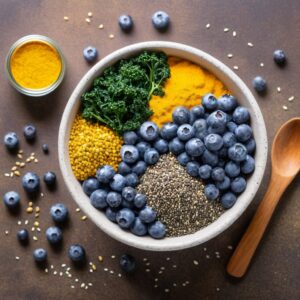What you eat during your period can have a significant impact on how you feel. Certain foods can help reduce cramps, bloating, and fatigue, while others may worsen symptoms like mood swings and discomfort. By making mindful dietary choices, you can support your body and have a smoother period experience.
Best Foods to Eat During Your Period
-
Leafy Green Vegetables
Foods like spinach, kale, and Swiss chard are rich in iron, which is essential to replenish the iron lost during menstruation. They also contain magnesium, which can help reduce cramps.
Tip: Add leafy greens to smoothies, salads, or soups for an easy nutrient boost. -
Fruits
Fruits like bananas, oranges, and watermelon are excellent for hydration and reducing bloating. Bananas are high in potassium, which can ease muscle cramps, while oranges provide vitamin C to boost your immune system.
Tip: Snack on fresh fruit or make a fruit salad for a refreshing treat. -
Whole Grains
Whole grains like oats, quinoa, and brown rice are rich in fiber and B vitamins, which can help regulate mood and energy levels. They also promote healthy digestion, reducing bloating.
Tip: Start your day with oatmeal topped with fruit and nuts for a balanced breakfast. -
Fatty Fish
Salmon, mackerel, and sardines are rich in omega-3 fatty acids, which have anti-inflammatory properties that can reduce period pain and cramps.
Tip: Grill or bake salmon for a healthy dinner option during your period. -
Dark Chocolate
High-quality dark chocolate (70% cocoa or more) is rich in magnesium, which can help relax muscles and reduce cramps. It’s also a great way to satisfy sweet cravings.
Tip: Enjoy a small piece of dark chocolate as a guilt-free dessert. -
Nuts and Seeds
Almonds, walnuts, and flaxseeds are packed with healthy fats, magnesium, and vitamin E, which can help reduce inflammation and improve mood.
Tip: Add nuts and seeds to yogurt, smoothies, or salads for a crunchy, nutritious boost. -
Herbal Teas
Teas like chamomile, ginger, and peppermint can help soothe cramps, reduce bloating, and promote relaxation. Ginger tea, in particular, has anti-inflammatory properties that can ease period pain.
Tip: Sip on warm herbal tea throughout the day for comfort and hydration. -
Water-Rich Foods
Foods like cucumbers, celery, and watermelon are hydrating and can help reduce bloating and water retention.
Tip: Include these foods in salads or as snacks to stay hydrated.
Foods to Avoid During Your Period
-
Salty Foods
High-sodium foods like chips, processed snacks, and canned soups can cause water retention and bloating, making you feel more uncomfortable.
Tip: Opt for fresh, homemade meals with minimal added salt. -
Sugary Foods
Excess sugar can lead to energy crashes and worsen mood swings. Avoid sugary snacks, desserts, and sodas.
Tip: Satisfy your sweet tooth with fresh fruit or a small piece of dark chocolate. -
Caffeine
Too much caffeine can increase anxiety, irritability, and breast tenderness. It can also disrupt sleep, which is crucial during your period.
Tip: Replace coffee with herbal teas or decaffeinated options. -
Alcohol
Alcohol can dehydrate you, worsen bloating, and disrupt hormonal balance, leading to more severe cramps or mood swings.
Tip: Stick to water, herbal teas, or natural fruit juices during your period. -
Fried and Fatty Foods
Foods high in unhealthy fats, like fried chicken or fast food, can increase inflammation and worsen period pain.
Tip: Choose baked or grilled options instead of fried foods. -
Refined Carbohydrates
White bread, pasta, and pastries can cause blood sugar spikes and crashes, leading to fatigue and mood swings.
Tip: Opt for whole-grain alternatives to keep your energy levels stable.
Hydration is Key
Staying hydrated is one of the simplest ways to reduce bloating and cramps during your period. Aim to drink at least 8-10 glasses of water daily. If plain water feels boring, try infusing it with lemon, cucumber, or mint for added flavor.
Sample Period-Friendly Meal Plan
- Breakfast: Oatmeal topped with banana slices, walnuts, and a drizzle of honey.
- Snack: A handful of almonds and a cup of herbal tea.
- Lunch: Grilled salmon with quinoa and a side of steamed spinach.
- Snack: Fresh orange slices or a small piece of dark chocolate.
- Dinner: Brown rice with roasted vegetables and a lean protein like chicken or tofu.
- Evening: A cup of chamomile tea to relax before bed.
Conclusion
What you eat during your period can make a big difference in how you feel. By focusing on nutrient-rich, anti-inflammatory foods and avoiding those that worsen symptoms, you can reduce discomfort and support your body. Remember, every person is different, so listen to your body and adjust your diet to suit your needs.
